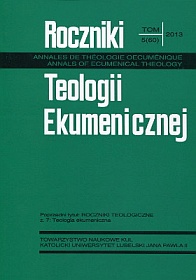Alienation and the Lack of Unity: The Results of the Original Sin
Abstract
The article discusses a few essential matters connected with the original sin: from Adam and Eva to the present day. The first part of the article refers to the sin of First Parents described in The Book of Genesis. It is a reminder of concrete and also universal history of the fall of a human, a trial for finding a reason of this event, as well. The second part debates the parallel of Adam-Christ from The St. Paul’s Letter to Roman – it is about the connection of people in the Adam’s sin and in the Redemption of Christ. The third part analyses a well-known medieval Augustine’s debate with Pelagius because a reason of this dispute was the original sin and to be more precise: a degree of its influence on human nature and on a free will. The fourth part of the article reminds that the original sin was a significant theme for The Reformation and for The Council of Trent. The issue of this argue was a relation between the original sin and concupiscence: for the Protestantism that was a relation of identity, for the Catholicism relation of causality; the issue has remained debatable to the present day. And finally, the fifth part of the article discusses in detail the problem of concupiscence as the heaviest ethically result of the original sin.
There were made two valid distinctions in the article. The first one is a methodological distinction, which was made already in the beginning of the article: distinction between the ethical guilt and the ontological result. This differentiation explains in a maximally straight form a mechanism of an influence of the original sin on the entire human race, even on modern people. The second one was made in the two last parts of the article: distinction between the original sin (every sin) and the concupiscence. This differentiation shows that a fight with concupiscence is possible and even necessary to authentic development of a human and rebuilding of interpersonal relations (in the ecumenical aspect: between the Christians), and offers a hope on “the return to the Paradise” (in the ecumenical aspect: recovery of unity of Church in a visible dimension).
References
Anonim z X-XI wieku: Ja-Ewa. W: Doire aniołów pełne. Poezja staroirlandzka. Przeł. E. Bryll, M. Goraj. Poznań 1998.
Antoniewicz M., Personalistyczna interpretacja grzechu pierworodnego. „Roczniki Teologii Dogmatycznej” 4 (59):2012 s. 259-273.
Apologia Konfesji Augsburskiej. www.luteranie.pl/pl/index.php?D=146 (11.04.2012).
Augustyn: Państwo Boże. Przeł. W. Kubicki. Kęty 2002.
Bramorski J.: Personalistyczny wymiar grzechu w świetle biblijnej relacji o upadku pierwszych rodziców, „Ateneum Kapłańskie” 137 (2001) z. 1 s. 4-16.
Chrostowski W.: Anatomia pokusy (Rdz 3, 1-6). „Przegląd Powszechny” 1984 nr 5 s. 198-207.
Formuła zgody. www.luteranie.pl/pl/index.php?D=224 (11.04.2012).
Gilson E.: Historia filozofii chrześcijańskiej w wiekach średnich. Przeł. S. Zalewski, Warszawa 1987.
Jan Paweł II: Adhortacja apostolska Reconciliatio et paenitentia. O pojednaniu i pokucie w dzisiejszym posłannictwie Kościoła. Wrocław 1999.
Katechizm Kościoła Katolickiego. Poznań 1994.
Kelly J.N.D.: Początki doktryny chrześcijańskiej. Przeł. J. Mrukówna. Warszawa 1988.
Konfesja Augsburska. www.luteranie.pl/pl/index.php?D=143 (11.04.2012).
Kunka S.: Do kogo należy grzech pierworodny? „Teologia w Polsce” 3 : 2009 nr 2 s. 229-243.
Lohfink N.: Opowiadanie o grzechu pierworodnym. W: Tenże. Pieśń chwały. Chrześcijanin a Stary Testament. Przeł. J. Doktór. Warszawa 1982 s. 54-68.
Luter M.: O wolności chrześcijańskiej. Przeł. W. Niemczyk. W: L. Szczucki (wybór i oprac.) Myśl filozoficzno-religijna Reformacji XVI wieku. Warszawa 1972 s. 23-71.
Obrycki K.: Koncepcja grzechu pierworodnego u Pelagiusza na podstawie jego „Komentarza do listu św. Pawła do Rzymian 5, 12-21”. W: H. Pietras (red.). Grzech pierworodny. Augustyn „Dzieje procesu Pelagiusza”. Kraków 1999 s. 177-185.
Pelagiusz: Komentarz do listu św. Pawła do Rzymian 5, 12-21. W: H. Pietras (red.). Grzech pierworodny. Augustyn „Dzieje procesu Pelagiusza”. Kraków 1999 s. 187-190.
Pismo Święte Starego i Nowego Testamentu w przekładzie z języków oryginalnych [Biblia Tysiąclecia], Poznań-Warszawa 1971.
Rahner K.: Podstawowy wykład wiary. Wprowadzenie do pojęcia chrześcijaństwa. Przeł. T. Mieszkowski. Warszawa 1987.
Schonborn Ch.: Podstawowe prawdy nauki Kościoła o grzechu pierworodnym. W: Ch. Schonborn, A. Gorres, R. Spaemann: Grzech pierworodny w nauczaniu Kościoła: głos psychologa, filozofa, teologa. Przeł. J. Zychowicz. Poznań 1997 s. 51-78.
Sobór Trydencki. Dekret o grzechu pierworodnym. W: S. Głowa, I. Bieda (red.). Breviarium fidei. Wybór doktrynalnych wypowiedzi Kościoła. Poznań 1989.
Światowa Federacja Luterańska, Papieska Rada ds. Jedności Chrześcijan: Wspólna Deklaracja w sprawie Nauki o Usprawiedliwieniu. www.luteranie.pl/pl/index.php?D=459 (11.04.2012).
Wiedenhofer S.: Główne formy współczesnej teologii grzechu pierworodnego. Przeł. L. Balter. „Communio” 11:1991 nr 4 s. 87-102.
Wojtyła K.: Miłość i odpowiedzialność. Studium etyczne. Londyn 1964.

